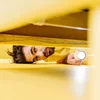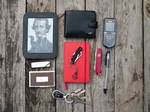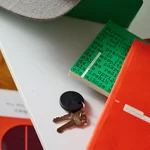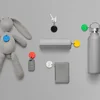

Lost And Missing Items: What We Lose The Most And Where We Lose It
How many times a week do you look for your keys? Or are you more of a ‘where’s my wallet’ type of person? We all have our moments where we can’t find the things that...
Lifestyle
Expected read time: 5 min
Fresh finding tips delivered straight to your inbox!
The better approach is to accept yourself for who you are (apparently not an organized person) and to find a way around the problem instead.
Before you start blaming yourself or checking if your forgetfulness is a symptom of a disease, think about your general lifestyle:
What does your average day look like?
And even more importantly, what does it feel like?
Are you perpetually busy, stressed, or hungry because you run out of time to eat?
Good news! Your forgetfulness is most likely curable with a good night’s sleep, a lighter schedule, and eating right.


Being stressed or focused on multiple things simultaneously will affect your memory and your brain will start prioritizing tasks based on immediate needs and importance.
A set of keys you put down and won’t need for a few hours doesn’t rank very high, so your memory chooses to focus on more pressing matters.
Our brain and its capacity have remained relatively the same for the past few thousand years, however, the amount of information our brain has to process and remember seems to be increasing with each generation.
How many essentials did your grandfather carry in his pocket? Most likely, there were a bunch of keys in one, a handkerchief in the other, and a wallet in his back pocket.


How many essentials do you carry in your pockets?
How about lifestyles? If you compare your day to your grandfather’s, would you say your day is more or less busy than his was?
Most of us would say our days are busier, so we have less brain power available to focus on details, but at the same time, our pockets are fuller, so there are more things we need to keep an eye on.


If you are otherwise healthy but are constantly losing your things, your problem is most likely a lack of focus. You just can’t focus on everything at the same time.
But that doesn’t stop us from beating ourselves up when we lose our things.
We all struggle with that inner voice that keeps asking us ‘Why did you do that again? Why can’t you do better?’ even though the answer is always the same and we know the mental beating won’t prevent us from making the same mistake again.
If you’re sick of feeling anxious about things that you've lost, here are a few suggestions to help you cope.
Be kind to yourself
It’s ok to get frustrated when you forget where you put your things. It’s also ok to forget where you put your things, it happens to all of us, so forgive yourself for making this particular mistake.
Dwelling on your mistake or doubting yourself can become a self-fulfilling prophecy, where you expect the worst of yourself before you even get a chance to prove that you are more than capable of keeping your things in your pocket.


Anxiety will only hinder your ability to keep your focus, without contributing anything positive, so the sooner you calm yourself, the better your chances of remembering where you put your things. Start slow and take a deep breath.
Remember what you’re trying to do – find your keys – and focus on that.
Are you stressed out?
Stress makes it difficult to focus, so it’s only natural for you to concentrate more on important things and let mundane things like where your keys are, slip through your memory.
If you can’t avoid the stress, try to reduce its influence with regular meals (with vegetables!), a short 10-minute walk, or even just taking 5 deep breaths while standing still. Clearing your mind for just a few minutes can do wonders for your memory.


Are you stressed out?
Stress makes it difficult to focus, so it’s only natural for you to concentrate more on important things and let mundane things like where your keys are, slip through your memory.
If you can’t avoid the stress, try to reduce its influence with regular meals (with vegetables!), a short 10-minute walk, or even just taking 5 deep breaths while standing still. Clearing your mind for just a few minutes can do wonders for your memory.


Source: PRNewswire
Look back
And we mean literally. Before you leave someplace, stop, turn around, and take another look at your surroundings. Changing your perspective just by standing a few steps away will help you pick up on things that you might miss from your usual position.
While you’re at it, do a mental checklist of keys-wallet-phone and make sure they’re all in your pockets.
This trick is especially handy with seasonal objects like umbrellas and sunglasses.
You might have the most amazing keys bowl by the front door, but if your keys are never in it, why keep it?
Instead, put your things in places where you subconsciously look for them. If you always look for your misplaced wallet on the nightstand first, keep it there.
In this instance, it might be easier to give in to your subconscious, instead of trying to school yourself into a new habit.


We’re always hardest on ourselves, so before you start to panic, get a second opinion – from your family and friends.
Ask them if they noticed any changes in your behavior; is it getting harder for your to remember things? Do you lose or misplace your things more often lately?
Remember that your brain, like the rest of your body, changes over time, so your misplaced wallet might just be part of the natural aging process. If you need a few more minutes to remember where you put it that is also normal.
However, if you do struggle to remember or even focus despite your best efforts, go see a doctor. Memory loss or the inability to focus might be a side effect of a different health problem your body is trying to deal with.


How many times a week do you look for your keys? Or are you more of a ‘where’s my wallet’ type of person? We all have our moments where we can’t find the things that...


Spatial memory stores information about your surroundings and about the constant small changes within it. Because your wallet moves around when you do, your spatial...


The average American loses about $5,591 worth of personal items in a lifetime. If you can relate, stop putting an unnecessary dent in your wallet and check out these 6...
Join our newsletter to get 10% off Chipolo POP, plus get weekly updates on deals, tracking tips and tricks, and a dash of fun.